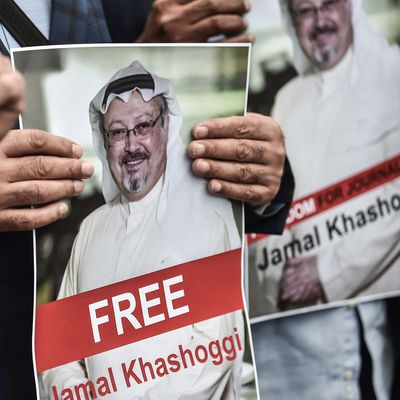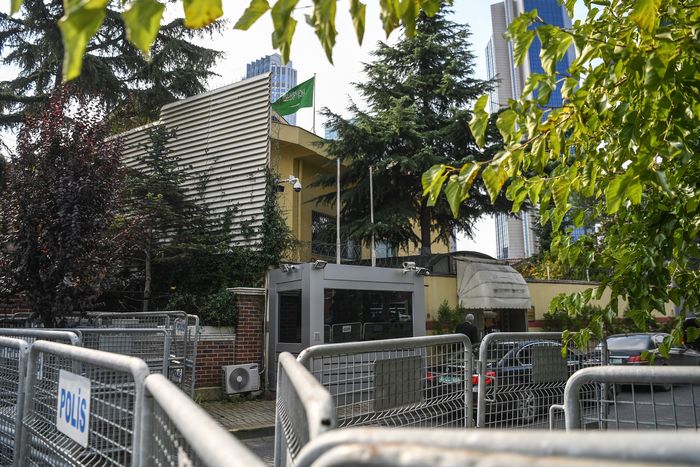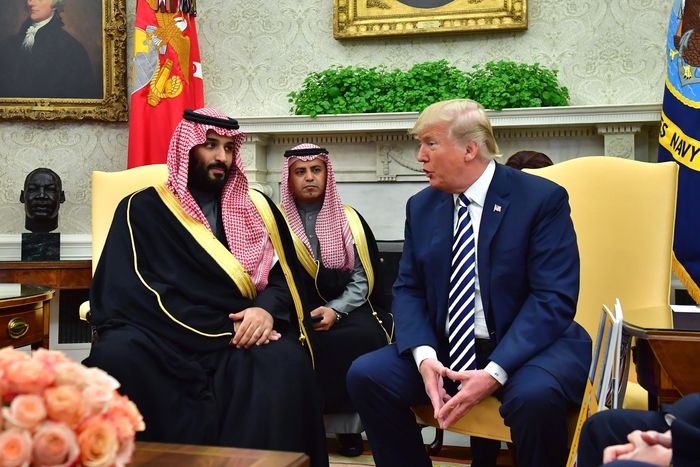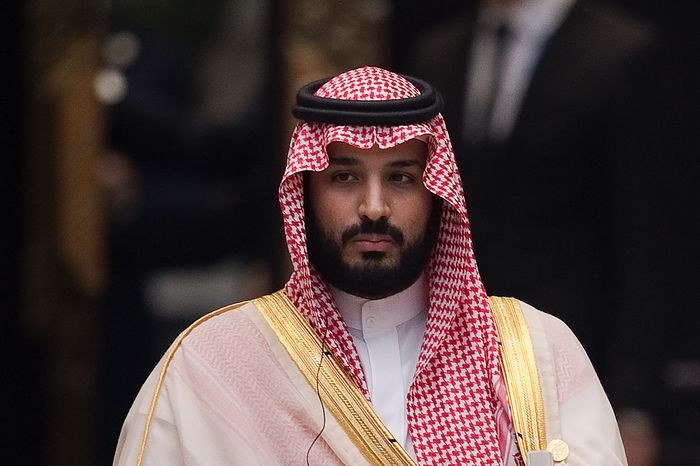
Jamal Khashoggi, a prominent Saudi journalist and self-exiled critic of Saudi Arabia’s regime, walked into the Saudi consulate in Istanbul last Tuesday to obtain a government document, and no one has seen or heard from him since. Not his Turkish fiancée, who waited for him outside the consulate for more than ten hours and then returned the next morning, nor his colleagues at the Washington Post, where the D.C. resident writes a monthly column — nor anyone, anywhere. The 59-year-old journalist simply vanished, and the mystery regarding his disappearance — and if Turkish authorities are correct, his brutal murder at the hands of the Saudi government — has become a full-blown international incident that could have major implications around the globe.
Here’s everything we know.
Needing a Document, Khashoggi May Have Walked Into a Trap
Khashoggi reportedly told friends that they shouldn’t worry about his visit to the consulate, but it clearly made him nervous enough to do some due diligence. The visit on October 2 was actually Khashoggi’s second trip to the consulate; he had gone the previous Friday and was told to return the following week. The document he sought was the confirmation of his divorce from his previous wife — whom he had left behind in Saudi Arabia when he fled the country in 2017 — so he could legally marry his Turkish fiancée, Hatice Cengiz. She and Khashoggi met at a conference in Istanbul this past spring, and he had been splitting his time between Turkey and Washington ever since.
He told friends that his previous visit to the consulate in Istanbul had gone well, and that its staffers “were just ordinary people” who had treated him “very warmly.” Khashoggi, a former insider with the royal family who was once a member of the Saudi elite, had also met several times over the past year with officials at the Saudi embassy in Washington. Those uneventful visits and Khashoggi’s lack of experience as an outsider, his friends told the Washington Post, may have left him with a false sense of security, even though Khashoggi knew as well as anyone — and often wrote about — how steep a price Saudis could pay for criticizing the regime. He also seemed to understand that he was one of the critics the regime would most want to silence, thanks to his scathing, high-profile columns for one of the world’s most influential newspapers. In last month’s column, he condemned Saudi Arabia’s “cruel war” in Yemen and called on the country’s de facto ruler, Crown Prince Mohammed bin Salman, to “bring an end to the violence and restore the dignity of the birthplace of Islam.”
Khashoggi reportedly told a friend that the crown prince, who is referred to as MBS, had recently reached out to him to ask him to return to Saudi Arabia and become an adviser — an offer Khashoggi rejected.
In the end, according to friends, Khashoggi seemed to have been more excited about getting married than he was worried about his visit to the consulate. But he was still wary enough to leave his two phones with Cengiz before entering on Tuesday, and telling her to contact Turkish officials should he not come back out.
His fiancée did call Turkish authorities, and after Khashoggi’s disappearance, she and his friends and colleagues and human-rights groups accused the Saudi regime of kidnapping him, something it has done to dissidents abroad in the past. Protesters began assembling outside the consulate to demand his release, and journalists, including his co-workers at the Post, began investigating what had happened to him.
Saudi Arabia denied that they had abducted or detained Khashoggi, and said he was neither in the consulate nor in their custody elsewhere. Crown Prince Mohammed bin Salman weighed in on the story himself last week, claiming that Khashoggi had soon left the consulate under his own free will soon after he arrived. The image-obsessed prince, who was a regular target of Khashoggi’s criticism both before and especially after the journalist’s self-exile, also insisted his government had “nothing to hide” and invited Turkish authorities to search the consulate.
The Saudis did not provide any evidence, like security camera footage of Khashoggi leaving the consulate, to support their claim, and have advanced no credible theories for Khashoggi’s disappearance. Turkish authorities, meanwhile, said they saw no evidence that Khashoggi had left the building, presumed he was still inside, and opened an investigation into the incident. The Saudis allowed Reuters reporters to tour the consulate on Saturday to prove that Khashoggi was not there, but also improbably claimed that their security cameras showed only live video feeds, and those feeds were not recorded, so they could provide no footage of Khashoggi’s exit.
Khashoggi’s Alleged Assassination
On Saturday night, a stunning and more gruesome theory regarding Khashoggi’s fate emerged. Unnamed Turkish authorities told Reuters and the Washington Post that Turkish police had concluded that Khashoggi had not only been detained inside the consulate — he had been murdered. A 15-man Saudi hit squad, Turkish sources believed, had carried out the premeditated assassination. Turk-Arab Media Association director Turan Kislakci, a friend and colleague of Khashoggi’s, said that authorities had told him the Saudis had brutally tortured Khashoggi before dismembering his body and removing it from the building in pieces. Turkey’s Anadolu news agency, a semi-official outlet for the government, also reported on Saturday that 15 Saudi citizens, including some diplomats, arrived in Istanbul on two separate planes on Tuesday, and were at the consulate around the same time Khashoggi was, and then later left the country. The Saudis were not identified. On Monday, Turkish officials told one of their U.S. counterparts that the pieces of Khashoggi had been carried out of the compound in boxes, then flown back to Saudi Arabia.
The Saudi consulate quickly put out a statement calling these accusations baseless.
As of Monday, Turkish authorities have produced no evidence to back up their allegations, and have not released any footage from the considerable number of security cameras monitoring the area around the consulate. An unnamed Turkish official told the New York Times that the evidence will only be released once the investigation is complete, so as to avoid inflaming what is already a strained diplomatic relationship between Saudi Arabia and Turkey. Turkish journalist and European Council on Foreign Relations fellow Asli Aydintasbas said that officials told her they did not have hard evidence, but still believed Khashoggi was dead.
Then, on Sunday, Turkey began making their allegations on the record: Yasin Aktay, an adviser to Turkish president Recep Tayyip Erdogan, called the evidence in the Khashoggi investigation “concrete,” vowed that the case would not go unsolved, and, along with other officials, demanded that Saudi Arabia “make a convincing statement” about what happened to the journalist. The BBC also reported that Taha Ozhan, the chair of the Foreign Affairs Committee in Turkey’s parliament, said that “we are sure” Khashoggi was murdered, and that Turkish police would soon be releasing more details about what they had discovered.
Turkish president Erdogan, however, did not release any new information or offer any official confirmations during a press conference on Sunday. Turkey’s longtime leader told reporters that he considered Khashoggi a friend and found the veteran journalist’s disappearance “very, very upsetting.” Erdogan said he was “following the incident, chasing it, and whatever the conclusions, we will inform the world about it.” The Turkish president added that authorities were going over security camera footage and were monitoring the country’s airports as part of their investigation, and that he was still hoping for a positive outcome.
On Monday, with international attention continuing to grow, the Turkish government officially asked the Saudi government to let law enforcement personnel conduct a search of the consulate, while President Erdogan demanded that Saudi Arabia produce proof that Khashoggi left the building alive.
In the meantime, nothing about what happened to Khashoggi — other than his disappearance — had been confirmed as of Monday afternoon.
Cengiz posted on Twitter on Saturday that she did not believe he was dead, but told the Times that she was still following the reports and was waiting for an official confirmation from the Turkish government.
The Reaction and Saudi Pushback
Many media organizations, journalists, politicians, and activists from all over the world have expressed outrage and concern over Khashoggi’s fate. Many theories have also emerged about what happened to him, particularly since neither of the governments at the center of the story can usually be trusted. Erdogan’s increasingly autocratic government is hardly a credible source when it comes to investigations with any political implications, and is the world’s number-one jailer of journalists. On the other hand, few regimes are more hostile to dissidents, critical journalists, or even low-level political activists than Saudi Arabia’s royal dictatorship. Both regimes regularly traffic in disinformation and promote scapegoats to influence their citizens; both have brazenly involved themselves in the foreign affairs of neighboring countries; both have cracked down on political opponents, social reformers, and democracy advocates; and both typically dismiss international attempts to rein in their worst practices.
Erdogan and MBS have also taken very public shots at each other in recent years. Erdogan’s support for Qatar, one of Saudi Arabia’s chief rivals in the region, has opened a large rift between the two Middle East powers. Erdogan has called Saudi Arabia’s efforts to isolate Qatar “inhumane and against Islamic values.” For his part, MBS claimed earlier this year that Turkey is part of a “triangle of evil” with Iran and Islamist terrorists.
Some have wondered if Turkey is floating the murder story in order to attack its Saudi rival, or to pressure Riyadh to admit it detained Khashoggi, or, as the Guardian’s Martin Chulov speculated on Sunday, to give the economically struggling Turks some leverage to get something out of the Saudis. Another theory is that the Saudis are feeding misinformation to Turkish authorities in order to ultimately embarrass Erdogan. Elsewhere, Saudi partisans on social media have advanced a hashtag blaming Qatari intelligence agents for Khashoggi’s alleged murder — a campaign likely conducted by Saudi-backed internet trolls. As the Huffington Post reported Monday, additional social media campaigns, undoubtedly orchestrated by the Saudis and their Gulf allies, soon followed.
On Sunday, the Saudi-owned news organization Al Arabiya provided a representative look at how the regime was working to defend itself. The site reported that Khashoggi’s prominent family in Saudi Arabia had released a statement declaring their trust in and support for the Saudi government, and criticizing “the objectives behind electronic media and frenzied news outlets that attack our country for negative purposes.” (The idea that the media was sensationalizing the story was a popular frame for much of the Saudi-aligned pushback.) The site also interviewed Khashoggi’s oldest son, who said he had never heard of his father’s Turkish fiancée and told her to stop talking to the media, then insisted the issue was simply a missing person case. The unofficial state-media site further highlighted how Saudi Arabia “holds the safety and well-being of its citizens wherever they are,” and had, with Turkey’s permission, sent a team of investigators to Istanbul to help find Khashoggi. Another article published on Sunday passed along a range of unsubstantiated theories from “observers” indicating that the entire story was a plot to discredit the Saudi regime, like a false-flag operation; or the work of the regime’s evergreen bogeyman, the Muslim Brotherhood; or that “many fingers continue to point at [Khashoggi’s] fiancée as the perpetrator.” Another rumor on social media, that Khashoggi’s body had been found in Istanbul on Sunday, was also unfounded.
The U.S. Response
After the State Department said it was investigating the reports of Khashoggi’s murder, the Washington Post reported on Sunday night that U.S. officials, including Secretary of State Mike Pompeo, “have been frustrated with the lack of a substantive response to direct high-level queries.” On Monday, six days after Khashoggi’s disappearance, the State Department said, “We are not in a position to confirm these reports, but we are closely following the situation.”
Then, President Trump commented. On Monday afternoon, he said, in response to a reporter’s question: “I am concerned about it. I don’t like hearing about it. Hopefully that will sort itself out. Right now nobody knows anything about it, but there’s some pretty bad stories going around. I do not like it.”
In a foreign crisis like this one, the U.S. ambassador to the country in question would normally take on an important role. But the almost two-year-old Trump administration still hasn’t named its ambassador to Turkey.
Considering Trump’s well-established favor toward the Saudi regime, it’s not clear how the U.S. would react should the Saudis be found responsible for abducting, harming, or assassinating Khashoggi. Saudi Arabia is, as it has often been, central to U.S. foreign policy in the region, and America’s best customer when it comes to arms sales. Last year, Trump announced that the U.S. had arranged to sell $110 billion in weapons to the regime, and though his characterization of the deal may have been a Trumpian exaggeration, it was still the largest-ever arms agreement between the two nations. The U.S. also refuels Saudi warplanes during their missions to bomb Yemen, and has accepted at face value the regime’s less-than-credible word regarding its (unsuccessful) efforts to avoid civilian casualties.
Political and international pressure over Saudi Arabia’s ongoing bombing of Yemen has been building, including bipartisan criticism from U.S. lawmakers, but it has yet to have much impact. By Monday, numerous members of Congress on both sides of the aisle had issued statements expressing alarm over Khashoggi’s alleged fate and calling for a significant response.
But since Trump has almost completely turned a blind eye to Saudi Arabia’s rising aggression and political crackdowns thus far, and the U.S. is literally fueling the regime’s ongoing war atrocities in Yemen, even Khashoggi’s alleged murder might not draw extraordinary attention — unless the president is moved by the media coverage or gets some stern advice from Fox News anchors. The other problem regarding the imposition of American leverage is that the U.S. and Turkey have been at odds since the trade-warring Trump doubled tariffs on the economically struggling nation last month, supposedly because Turkey has refused to release an American pastor who has been held captive in the country for almost two years.
“Our relations are not good with Turkey right now,” Trump himself said at the time.
Saudi Arabia’s Well-Earned Reputation
One thing many analysts who cover foreign affairs and the Middle East seem to universally agree on is that they wouldn’t be at all surprised if the Saudis did orchestrate Khashoggi’s execution. The regime has a long-standing reputation for crushing dissent both in and outside its borders, and it’s gotten even worse under Crown Prince Mohammed bin Salman.
In recent years, the Saudi regime has repeatedly demonstrated a lack of restraint when it comes to its foreign and domestic policy. MBS may have savvily convinced many leaders and pundits that he is a Western-friendly reformer on social issues and the Saudi economy, but he has embraced increasingly aggressive and brutal tactics at the same time. He has already undertaken a stunning power grab in the Kingdom, rounding up and imprisoning numerous political rivals and fleecing Saudi businessmen under the guise of an anti-corruption campaign. And under MBS, Saudi Arabia has become more and more of a hostile, sometimes unstable, player on the world stage, all in order to gain more control over the Middle East.
Saudi Arabia is currently waging a brutal and bloody proxy war in Yemen — fought with U.S. supplied weapons — which has devastated the already reeling country and resulted in the deaths of countless civilians. The Saudis tried to dominate their Gulf rival Qatar last year by leading a multi-nation economic blockade of the country under a far-fetched pretense. The Saudi government has also kidnapped and robbed the prime minister of Lebanon, hysterically tried to cut off all relations with Canada after it criticized the regime for arresting a prominent Saudi women’s rights activist, and initiated a crackdown on political freedoms and dissent within its borders. In addition, the country’s government already held one of the world’s most dismal records when it comes to respecting human rights, has kidnapped and repatriated other dissidents in the past, and employs torture, long-term imprisonment, and even capital punishment in its persecution of political activists.
The Saudi’s brazenness increased following the election of Trump — an autocrat-admirer who always swoons at demonstrations of strength, and who last year effectively told Saudi Arabia’s King Salman, MBS’s father and chief backer, that he considers him the leader of the Muslim world. Previous administrations — particularly President Obama’s — have tried to at least somewhat contain Saudi aggression — though none have stopped supporting and enabling the regime with arms sales. But Trump doesn’t just look the other way — he and his advisers, like son-in-law and MBS friend Jared Kushner, are cheerleaders for the royal family’s power moves. The Trump administration also considers the Kingdom a crucial part of the administration’s efforts to confront Iran, suppress Palestinian self-determination, and institutionalize U.S. Islamophobia.
The last two years have seen what happens when Saudi Arabia no longer feels it has to ask the U.S. for permission to do anything. So it would make sense that MBS could also now believe he could get away with executing a high-profile Washington Post–employed journalist within the borders of a NATO member country.

































